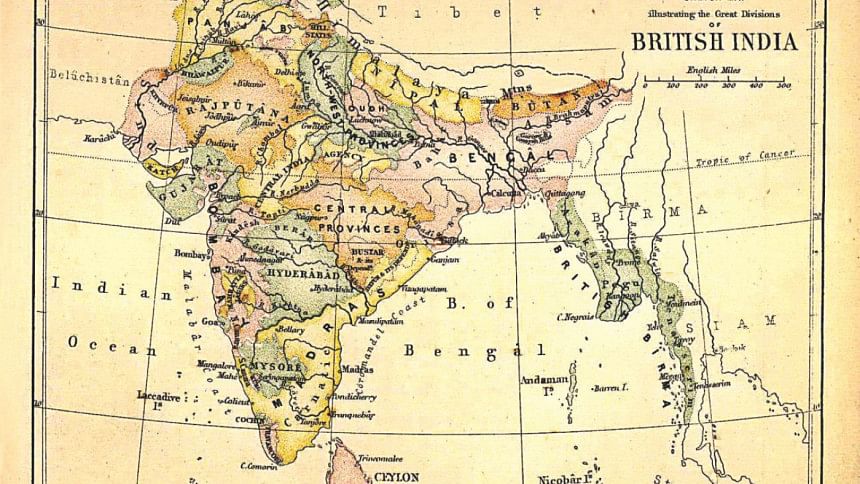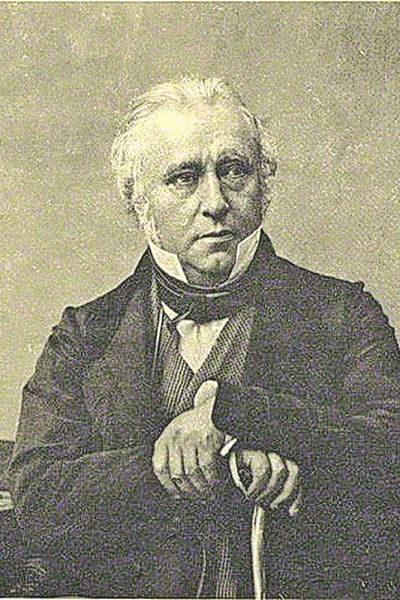Ghost of a colonial past

Practically all the institutions of our state are institutions that we have inherited from our about-200-years of British colonial rule. Pax Britannica was intentionally designed to be of everlasting nature. In imperial Britain's imagination, the sun would never set on the British Empire.
The intellectual foundation for this lofty aspiration (everlasting, it would appear with hindsight) were laid by Thomas Babington, Lord Macaulay in his famous Minute delivered to the British Parliament on February 2, 1835. Lord Macaulay was at that time Chairman of The Council on India established by Parliament. His Minute was in response to a debate underway on the shape of the system of education that British administration in India should promote, and what funds should be allocated by the Crown for that purpose. Before the Parliaments there were competing proposals, with proponents for Arabic and Sanskrit as the dominating medium of instruction, trying to establish their respective cases (witness here the first signs of the communal-driven tectonic plates beginning to move subterranean).
Macaulay vehemently, and passionately, opposed those moves and called for the establishment of English as the dominant mode of instruction and education. He did so brilliantly using arguments citing the need for, inter alia: judicious use of funds for intellectual reasons ("fund to be employed as Government shall direct for the intellectual improvement of the people"); logical use of the funds to be channelled, using a living language (English) that was the repository of classical and scientific knowledge instead of channelling those funds to promotion of ossified languages (Sanskrit, or Arabic or, by way of analogy, ancient hieroglyphics of Egypt—"never found one among them who could deny that a single shelf of a good European library was worth the whole native literature of India and Arabia"); and sound economics ("we are forced to pay our Arabic and Sanscrit [sic] students while those who learn English are willing to pay us"). But the clinching argument, for its sheer long term breadth of vision, simply takes the breath away: "We must at present do our best to form a class who may be interpreters between us and the millions whom we govern—a class of persons Indian in blood and colour, but English in tastes, in opinions, in morals and in intellect. To that class we may leave it to refine the vernacular dialects of the country, to enrich those dialects with terms of science borrowed from the Western nomenclature, and to render them by degrees fit vehicles for conveying knowledge to the great mass of the population."
Having adopted the above rationale, the British then systematically hand-picked people from across the wide spectrum of Indian social strata, cutting across diverse faiths, ethnicity, caste and class divisions, transporting them physically to British educational institutions in various disciplines at various levels. Stalwarts like Gandhi, Nehru, Jinnah, Ambedkar and a host of others were, in a sense, all refined end-products of the above process. Towards the same end, they established across their colonised realms schools run by their compatriots imparting the British curriculum of education along with its imbedded value system. When the British finally conceded (albeit in very rudimentary form) "self-rule" to their Indian subjects, it was through the establishment of institutions meant to resemble, in mannerism, style and operation, the British systems, whether parliamentary, judiciary or administrative. Sipping at the fountains of occidental knowledge and mannerisms, all these recruits also imbibed new ideas that challenged their traditional beliefs or practices, and at the same time, ironically, also deeply imbedded in each a sense of rediscovering a sense of the inner self that had laid as a given, dormant and forgotten for long—a nascent sense of their "nation-ness" rooted in their traditional belief systems that had previously been subsumed in the larger syncretic order of being Indian or of "Indian-ness".
In my view, as I look back in hindsight, these first self-introspective questioning of their identities in those first crop of handpicked individuals, coming as they did from such diverse backgrounds and then thrown together in what was supposed to be a melting pot of fusion into one hybrid identity, translated rapidly across wider swathes of the communities from where these different future leaders were plucked, ultimately unleashing primeval instincts among their respective massed communities of origin that the "Occidentalised" English-educated leaders did not quite fathom or imagine had existed. Masses of their followers, not having had the privilege of dipping into the fount of English education, but merely being sprinkled with some bottled drops of the same, like rose water on a congregation, were galvanised into an awareness of self that led them increasingly to willingly sacrifice everything and die, or kill others, for securing for their respective identities, their new-found sense of "nation-ness", their rightful place in the sun.
Where does the wellspring of love for one's nation lie, and what drives people to willingly die, or kill, for what they call "their nation"? Benedict Anderson in his Imagined Communities offers an appealing explanation of this phenomenon. Anderson describes what he calls "nation-ness", as a phenomenon which is essentially a state of the mind, a distillation of one's perception of oneself in relation to the world around him, and to the myriad "others" that cohabit this terrestrial space with him. Trying to explain, analyse and parse something which can be (indeed is, in a sense) very abstract is by no means an easy task considering, as he admits at the outset, that "nation, nationality and nationalism—all have proved notoriously difficult to define". He asserts that while there can be no scientific explanation for this phenomenon, none can deny that it does in fact exist—in the imagination of peoples' minds. But this imagination is no elusive aerie faerie will of the wisp; while very much a state of the mind that is as unfathomable as the mind itself, its manifest expressions can be most palpably felt and expressed. I find this explanatory path appealing, reminiscent and evocative of the analogous sense of "state-ness" that J.P. Nettl, in his seminal essay on "The State" asserts, is so essential to the existence, and indeed viability, of any state—much like, and along the same vein and extension of, the Descartian logic that explains the existence of oneself in the profoundly simple statement: "I think, therefore I am".

While triggering the process of creating the new class of interpreters who were conceived as ensuring the continuity of Empire, Macaulay may have actually, unwittingly, set in motion the wheels for the ultimate disintegration of the Empire. Colonialism's rise and spread flowed, essentially from the consolidation of the European Westphalian order in the European mainland where it had originated. But the colonising process also triggered "Westphalian" awakening of identities among the ruled colonial masses that had remained dormant for long in a state of largely blissful unawareness and slumber, as well as with no sense of boundaries separating them. Once awakened, these different newly rediscovered identities, meshed and interspersed for so long as they had been in a fusion-generic sense of self, came into friction with each other in a manner that was bound to ignite and explode at some point. The collapse of European colonial might, drained of wealth and energy by two great wars, created the vacuum into which post-Colonial neo-Westphalian disorder rushed in like a hurricane, following the end of World War II, with a prolific unparalleled in history mushrooming of new states coming into existence, overnight. That process has tapered considerably by now, but has not yet ended entirely it seems.
The actual manner in which our British colonial masters operationalised the institutions that they transplanted into their colonised domains was actually quite different from the original British prototypes for two reasons. Firstly, the purpose of the institutions transplanted overseas, while replicating the original institution at home, was fundamentally different. The institutions in Britain were designed to govern and deliver services for the welfare of the Crown's subjects for which funds were so allocated; their replicas on colonised soil were, in sharp contrast, designed to rule domineeringly over conquered peoples subjugated often by violent force. They were also designed to extract everything extractable from the colonised subjects in order to fill the coffers of the Crown at home to enable continuing projection of imperial power and writ overseas. Secondly, the local soil conditions, in their inherent composition and "pH" factors were quite different from the "home" soil conditions from which these institutions had been plucked and transplanted. For example, our parliamentary system worked (and they still do, decades after birth) in a very authoritarian (or monarchical) manner. Our leaders tended to (and still) evoke the imperial (and imperious) style of highly authoritarian rule (as distinguished from governance) of our pre-colonial history; our keepers of law and order tended to (and still do) arouse a mixture of apprehension and fear within the hearts of those they are supposed to protect, rather than the secure sense of security and comfort that the average British citizen derives from the sight or presence of the "friendly neighbourhood Bobby" walking the walk and talking the talk in his local precinct; and so on and so forth.
In sum, tragically, when the gora sahibs packed up to return to their native homeland, the thrones they vacated were taken over by the brown and black sahibs whom the British had educated and groomed, very much in the mould of interlocutors as had been envisaged by Macaulay, continuing to act as "intermediaries" between the British rulers and their Indian subjects. Lord Macaulay's spirit must surely be chortling with satisfaction and glee, wherever it rests today, as it witnesses the continuing flourishing of his seminal precepts voiced a little less than two centuries ago.
The erstwhile colonies may have wrested their freedom from British shackles, but their new rulers and administrators had not been able to shake off and change for the better the mindset, of ruling (rather than governing) by coercion and extraction that they had inherited from their erstwhile white masters. True independence from continuing tyranny by the successor ruling elite, and from oppressive extraction by the bureaucracy and their more often than not brutally enforcing police, eluded the hapless people.
At a seminar that discussed human rights and rule of law in Bangladesh, convened by a Washington think-tank in 2005, in which I was one of the invited panellists, the suggestion for police reforms was raised. One discussant, representing an international NGO had asked me if I would recommend that substantial sums of money be made available to the then government of Bangladesh for modernisation of equipment and for training the police to make them more effective. My immediate response to that suggestion was a horrified "NO." I had pointed out then that the laws as they existed, though quite antiquated and in dire need of being updated and upgraded, still worked. All that was lacking was monitoring whether they were being applied or followed, and enforcing them. I also pointed out that the police were an instrument of the state, a tool in the hands of the rulers. It could well be likened to a kitchen knife, which by itself was quite harmless, albeit an extremely sharp-edged and potentially dangerous, tool. It depended entirely on the intention of the person wielding that sharp edged tool as to what use he was going to make of it—to slice an onion or chop some vegetables and cut fish or meat for cooking a gourmet meal—or to cut into, and down, an inconvenient and disliked person. The vast majority of the population perceived the police as an instrument of oppression and terror. Refurbishing them with more efficient weapons and tools of policing, and training them to use these tools with greater efficiency, might very well result in the ordinary people being "more efficiently oppressed and terrorised," not necessarily more efficiently and better policed and safeguarded.
So, in my view, the reforms had to start with untangling and setting right the crossed wires in the head of the person wielding the knife, so to speak. I daresay, the point I made was very well taken. Simply putting laws in place, or upgrading them, is not enough. One needs to not only ensure that the laws are applied and enforced in letter and in spirit, but also that there is a body to monitor those charged with the enforcement of the laws, to ensure that they do so in fair and just manner.
Having said that, one is also conscious that a broad consensus in society is also essential to ensure that whatever reforms are being put in place will not be rolled back or negated by subsequent elected governments continuing in partisan squabbling. Having decided to import institutions to serve our needs, we need to not merely tend caringly for these institutions; we need to tend even more energetically to bringing about a happy rebalancing of the "pH" factor of the soil where we have transplanted these institutions, making the soil more hospitable to the organic growth and evolution of these institutions and bringing them to palatable and delectable fruition. The parliament needs to enact laws for the general good and welfare of the people which elects it and vested powers to govern to it; the judiciary, at all levels, needs to administer justice blindfolded; the bureaucrats need to be instilled with the spirit of administering without fear or favour; and the police need to be trained to look on themselves as guardians and protectors of the ordinary people they are meant to serve. A major behavioural orientation needs to take place. Otherwise, we are doomed to live in a state of déjà vu for long, and the past shall never be past.
Tariq Karim, a retired career diplomat and academic, is now at BRAC University as Visiting Fellow.





Comments